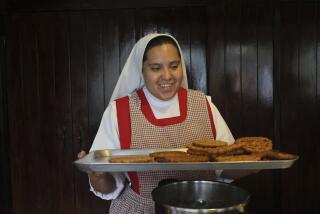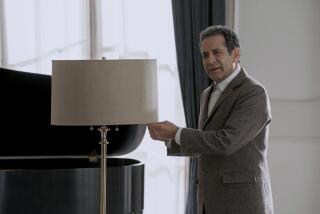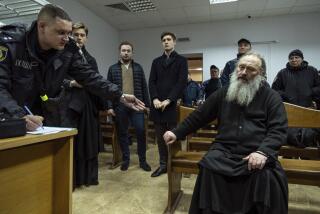A Life of Prayer, Charity and Ink Cartridge Sales
- Share via
SPARTA, Wis. — Eight times a day, the Rev. Bernard McCoy solemnly chants prayers in Latin from 100-year-old books in the chapel of his monastery.
Then it’s back to his computer and telephone, to run LaserMonks.
McCoy and four other monks who have vowed a life of prayer, austerity and charity sell refilled inkjet and laser printer cartridges from an Internet site and telephone mail-order center at the Cistercian Abbey of Our Lady of Spring Bank here.
“You get quality products at a great savings,” McCoy said. “We do good work with the extra income. Plus the monks pray for you. I don’t think Staples ever offered to do that.”
The Roman Catholic monks hope their 2-year-old business will raise hundreds of thousands of dollars for them to do good deeds, such as support a camp for children who have HIV or a computer school for street children in Vietnam.
McCoy likens himself and his colleagues to “the little Davids that came along to play in the Goliath world.”
Chester Gillis, a theology professor at Georgetown University in Washington, says LaserMonks is consistent with monastic ideals and traditions that focus on prayer and work.
“All they are doing is adopting to the contemporary technology,” he said. “If raisin bread is not selling, used laser cartridges refilled might.”
LaserMonks sells printer goods made by others at prices 30% to 90% lower than those at retail stores, McCoy said.
The charismatic, savvy North Carolina native, 36, sees LaserMonks as continuing a tradition started hundreds of years ago when monks copied manuscripts for people.
The idea has the blessing of the Rev. Josef Tomann Meinrad, procurator general of the Cistercian order’s headquarters near the Vatican. He says he favors anything that promotes the Christian message or provides information.
Last year, LaserMonks generated about $500,000 in sales, enough for a $30,000 profit, McCoy said. He hopes to at least quadruple sales this year.
“I almost feel bad making that much. I do,” he said, laughing. “But we have a lot of things to do, a lot of people we want to help.”
Monks elsewhere also are employed online, doing things such as cataloging, website designing and editing manuscripts, said the Rev. William Skudlarek, an assistant administrator at St. John’s Abbey in Collegeville, Minn., one of the largest monasteries in the world, with 175 monks.
Many monasteries continue with the more traditional jobs of baking bread or fruitcakes, but some in Europe are making specialty soaps or medicinal wines, Skudlarek said. An Oregon monastery runs a wine warehouse, and one in Iowa builds caskets.
LaserMonks makes no products but markets and distributes them, making the idea somewhat different, Skudlarek said.
“This is kind of the modernized, updated version of ... live by the labor of your hands,” he said.
LaserMonks processes some orders at the monastery, but most are shipped directly from manufacturers to customers under deals worked out between the companies and the monks, McCoy said.
The Rev. Robert Keffer, superior of Cistercian Abbey, welcomes the early success of the for-profit LaserMonks, especially after a failed real estate venture put the nonprofit monastery $500,000 in debt several years ago.
“This is kind of miraculous,” Keffer said.
Over the years, the monastery has supported itself through financial investing, real estate, forestry and the rental of farmland. Its annual expenses total about $150,000, and LaserMonks is an effort to be self-sustaining, McCoy said.
He acknowledges that the company, which gets as many as 200 customers a day, benefits from people’s curiosity about the monks themselves.
“Monks are cool. Monks are in. People like monks,” McCoy said. “Tie that with charity and with an absolutely necessary product that you can get at a better price guaranteed, once people hear about us, it is a no-brainer.”
LaserMonks is a hybrid of a similar venture started by two Colorado women, Cindy Griffith and Sarah Caniglia. They were looking to sell their business when they heard about LaserMonks, offered to share their expertise with the monks and ended up working for them by running the call center.
McCoy hopes one day to make enough money to build a church on the grounds of the 17,000-square-foot, 30-room stone monastery.
“Monks are not at all what people think we are. We are not quiet church mice,” McCoy said as the monastery’s pet dogs Luxor and Ludwig lounged nearby. “There is a lot of pioneering spirit in us.
“If all this fails tomorrow. Fine. We will pick up and keep going.”
More to Read
Inside the business of entertainment
The Wide Shot brings you news, analysis and insights on everything from streaming wars to production — and what it all means for the future.
You may occasionally receive promotional content from the Los Angeles Times.










